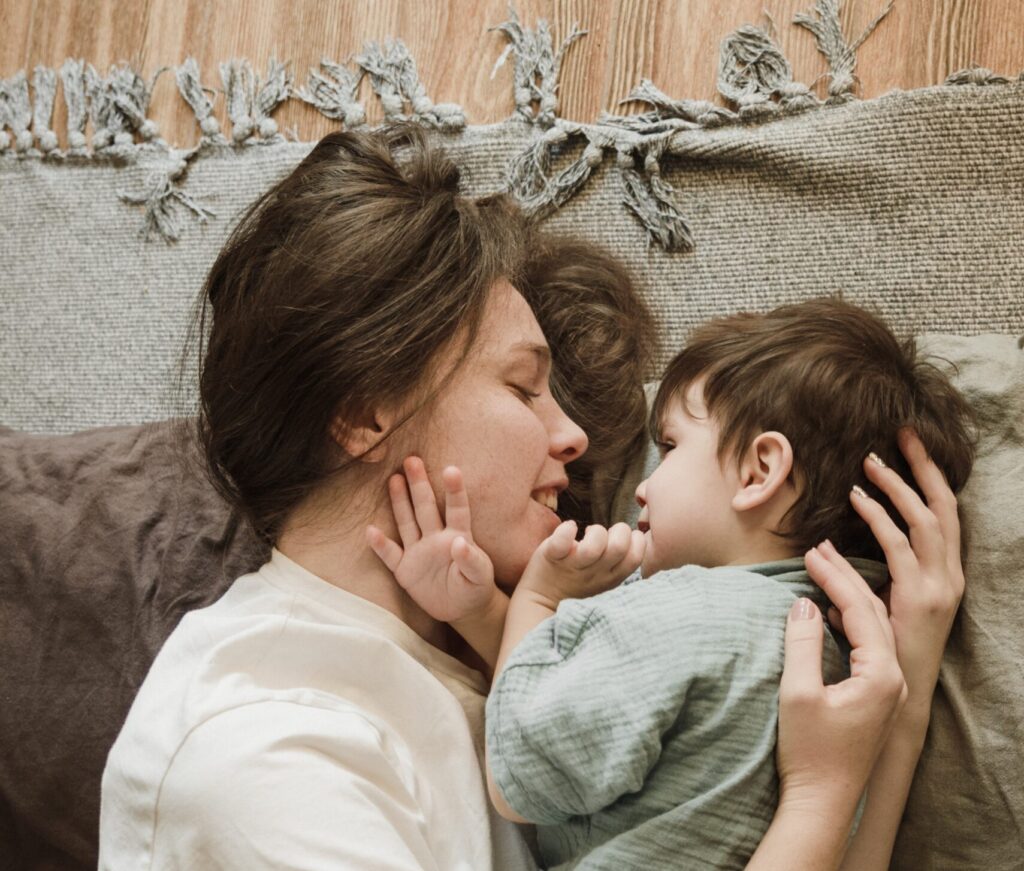It’s not just our little ones who go through different stages of sleep. Understanding what REM sleep is will help you to unpick your own sleep swell as your little monkeys. Have you ever woken up from a dream so vivid, so utterly bizarre, that you couldn’t help but wonder what’s really going on in your brain while you snooze? Well, you’re in for a treat today, because we’re going on a journey into the captivating realm of REM sleep. Grab your favourite blanket and a cuppa (with a biscuit of course), and let’s explore the enchanting world of REM sleep together!
The Sleep Stages Unveiled
Before we dive headfirst into the enchanting world of sleep, let’s take a quick refresher on the sleep stages. You see, sleep isn’t just one long, undisturbed snooze. It’s more like a well-choreographed dance with several stages, each with its own unique moves.
The first three stages are collectively known as NREM (non-rapid eye movement) sleep. These are the stages where your body is gradually winding down, your breathing becomes more regular, and you’re still somewhat aware of your surroundings. It’s like the opening act of a great show. As your baby grows their sleep cycles develop into the more sophisticated sleep stages we have as adults. This is believed to be the cause of ‘sleep regressions’.
But onto the real star of the show? REM sleep!
The REM Stage: Where Magic Happens
Imagine your sleep as a captivating movie, with REM sleep as the climax, the part that leaves you on the edge of your seat, eager to see what happens next. REM stands for Rapid Eye Movement, and boy, does it live up to its name!
During REM sleep, your brain is more active than any other time during your snooze. Your heart rate quickens, your breathing becomes irregular, and the most iconic part: your eyes dart around beneath your closed eyelids. It’s like a cosmic light show happening right behind your eyes!
But here’s the real showstopper: the dreams themselves! REM is when your brain transforms into a movie director, screenwriter, and actor, all rolled into one. It’s the dream factory, where the wildest and most vivid dreams take center stage.
Ever had a dream where you’re flying over a rainbow or having a conversation with your pet parrot about your favorite pizza toppings? That’s the magic of REM sleep. It’s responsible for those fantastical journeys, emotional rollercoasters, and bizarre adventures that you embark on every night.
The Science Behind the Magic
Now, let’s peek behind the curtains and understand what’s happening in your brain during this sleeps stage. Scientists have been busy unraveling the mysteries, and while we’re still piecing it all together, we’ve got some pretty solid theories.
First off, REM sleep is a time of heightened brain activity. Your brainwaves during this stage look a lot like the ones you produce when you’re awake. This activity is essential for learning and memory, like your brain’s way of hitting the save button on your daily experiences.
Next up, a little quirk that sets REM sleep apart: muscle paralysis. While your brain is running a marathon of activity, your body is as still as a statue. This ingenious mechanism keeps you from physically acting out your dreams. Imagine what could happen if you dreamt you were playing air guitar and your limbs decided to join the band!
But what about those rapid eye movements? Well, those eye movements might be connected to the vividness of your dreams. It’s like your eyes are tracking the action on the big screen while the rest of your body takes a well-deserved break.
The REM Sleep Cycle
REM sleep isn’t a one-and-done deal; it’s more like a recurring character in a series. Your night’s sleep is composed of several sleep cycles, and each cycle includes a chunk of REM sleep. At the start, these REM episodes are relatively short, lasting only a few minutes. But as the night goes on, they get longer and more intense. By the time you’re approaching morning, the final REM stage can stretch up to 30 minutes – that’s prime time for your dreams to shine!
Why REM Sleep Matters
You might be wondering, “What’s the big deal about REM sleep anyway?” Well, it’s not just for entertainment purposes; it plays a crucial role in your overall well-being.
- Memory Booster: REM sleep acts like a memory upgrade. It helps organize and store the information you’ve gathered throughout the day, making it easier for you to recall later.
- Emotional Processing: Ever notice how a good night’s sleep can make a challenging situation seem more manageable? That’s because REM sleep helps you process emotions and gain new perspectives.
- Creativity Incubator: REM sleep is like your brain’s incubator for creativity. Many artists, writers, and innovators have credited their dreams for inspiring their groundbreaking work.
- Problem-Solving Power: If you’re grappling with a tricky problem, sometimes the solution can pop up in a dream. Your REM-sleeping brain is like a backstage coach, helping you find answers.
The REM Sleep and Health Connection
But here’s the kicker: messing with REM sleep can have some serious consequences for your health and well-being.
- Mood Matters: Reduced REM sleep has been linked to mood disorders like depression and anxiety. So, if you’re feeling down, prioritizing good sleep might be the ticket to brighter days.
- Memory Mishaps: If you’re not getting enough REM sleep, your memory might take a hit, making it harder to remember details and learn new things.
- Weighty Issues: Surprisingly, lack of REM can also be linked to weight gain. It messes with your hunger hormones, making you more likely to reach for unhealthy snacks.
- Brain Fog: Feeling foggy and unfocused? It might be because you’re skimping on REM sleep. A solid night’s rest can help clear the cobwebs from your mind.
Wrapping Up Our Dreamy Adventure
So, there you have it, the superstar of your nightly sleep cycle! It’s the time when your brain throws a party, and you’re the guest of honour, whether you remember it or not. The next time you wake up from a wild and wacky dream, just remember that it’s your brain’s way of processing life!
Take care of your sleep, cherish your dreams, and let REM sleep be the leading star of your nightly escapades.
Sweet Dreams
Emily
xxx
To find out more about your little ones sleep check out one of our other blog postshttps://diddidreamers.co.uk/blog-sleep-help/

